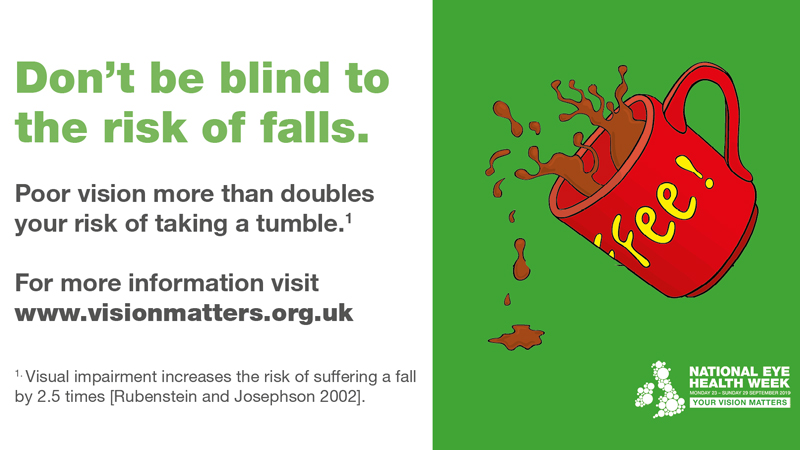Falls Prevention Week campaign creates connections and opportunities for northern region LOCs
29 November 2019
National Eye Health week 2019, in late September, coincided with National Falls Prevention Week, an initiative aimed at reducing the risk of falls in vulnerable people and encouraging those who have suffered a fall to visit their GP to identify any underlying health cause. LOCs in the northern region took the opportunity to combine the two campaigns and raise awareness of the effect that low vision can have on falls risk. The campaign was the result of a multidisciplinary collaboration between NHS England Improvement, North East Regional LOCs, North East Ambulance Service NHS Foundation Trust and Public Health England and NE Public Health teams.

The campaign included posters, social media content and work with regional media. A survey, coordinated by Gateshead Public Health was also conducted among various groups to explore the understanding of the links between falls and poor vision.
Stephanie Cairns, Chair of Northumberland, Tyne and Wear LOC, led LOC involvement in the campaign and liaised with the other bodies involved and she explains how the initiative went: “The campaign went out across Twitter and Facebook and by the end of the week it had been taken up across most of the CCG organisations across the region, plus some of the regional opticians got involved. The balance was a little more on the falls and less on the eyes, but the LOCs pushed out eye health messages and so did Gateshead Public Health amongst others.”
During the week Stephanie took part in a radio programme with local station Spice FM, and this has yielded a further opportunity to spread the message about the importance of eye health: “The session is run by Healthwatch and they realised that they’ve covered things like diabetes, healthy eating and many other issues that have an impact on eye health, but not actually covered that topic specifically. I’ve been invited back to do a session covering specific eye concerns related to the station’s listeners. The station is targeted at the ethnic minority community in the area, so I am going to be talking about glaucoma risk and management, together with Sushma Kotecha, one of our local optometrists, and Hannah Morrow from the International Glaucoma Association.”
The Falls survey questionnaire was completed by 58 respondents, half via the local sight loss charity, Sight Service, and half in local optical practices and a few from community groups. The results yielded interesting insight into views around falls, with 72% of those surveyed saying that they felt having a fall was an unavoidable part of getting older. Among those who were surveyed through Sight Service, there was good awareness of the link between vision and falls, but those who were not already engaged with sight support had much lower awareness of the connection.
The results of the survey have made Healthwatch consider whether they need to do more around vision awareness, which Stephanie sees as a positive outcome. “I have a meeting with Healthwatch next month to explore the possibility of getting their focus groups talking about eyecare and their experience of primary care optometry as well as the rest of the eye care journey. This could result in getting some public data on the issue which we can then use to explain the current system, including where the gaps are, to other stake holders and how we could address that with the right funding.”
Following the campaign and connected with her other activities in low vision awareness, Stephanie has also been invited to feed into some of care navigation programs used by the CCG locally, again with the aim to highlight gaps in current provision.
Reflecting on the campaign overall Stephanie believes it was positive, but there is more work to do: “I’d like to thank those optical practices that did join in but it would have been better if more had really got behind it – as an LOC we need to think of more ways to get them better engaged.” However, she feels there is merit in continuing to focus on campaigns like this, particularly in the northern region: “We know that statistically we are in an area of high health inequality, which indicates a greater chance of sight loss due to related conditions. This in turn has an impact on the chances of people becoming frail due to increased difficulty with self-care and/or falling. We need to persuade all public health teams that sight is interconnected with all health issues and build awareness of how we can help address that.”

